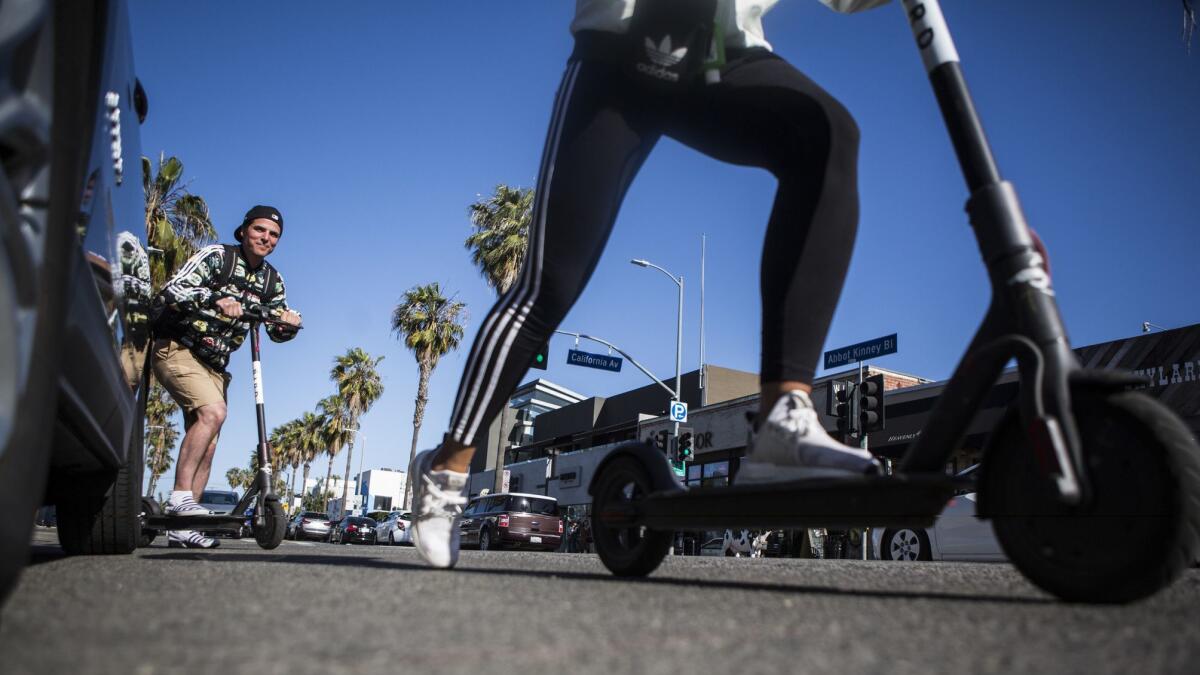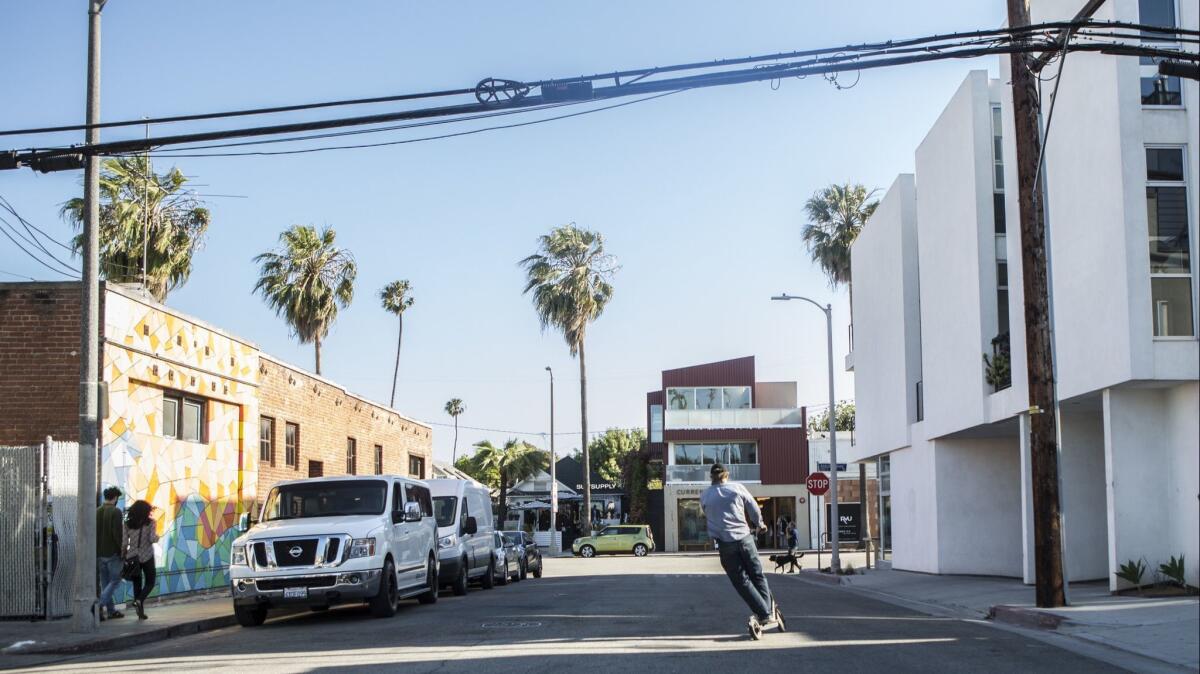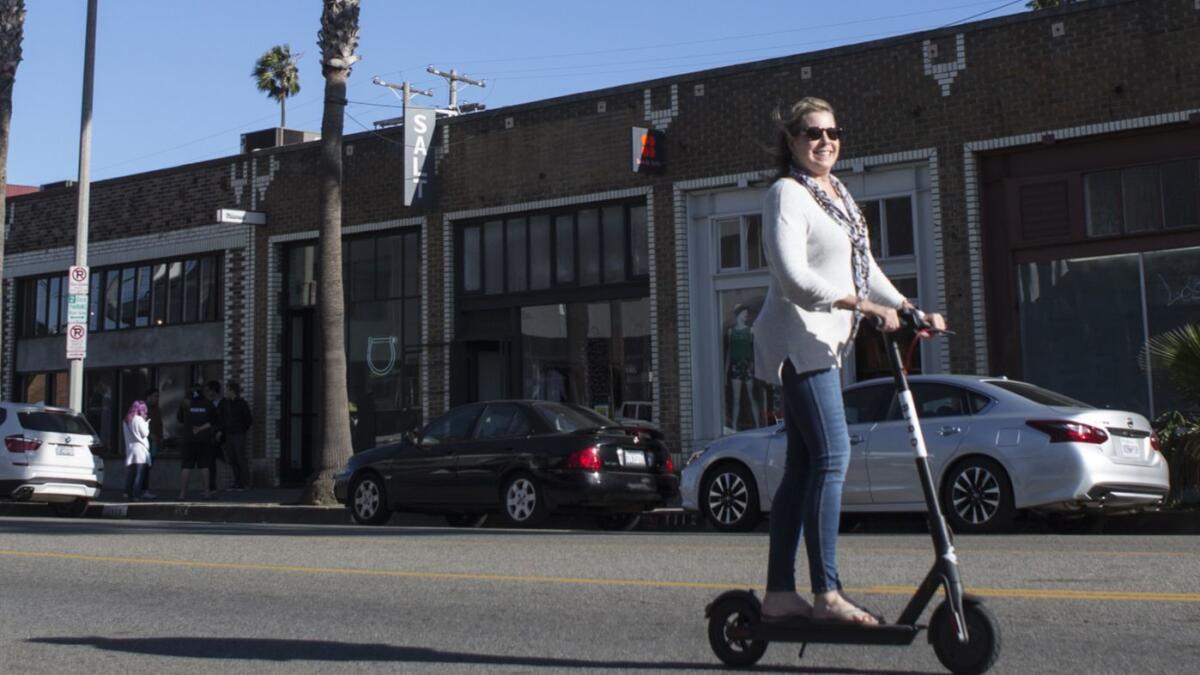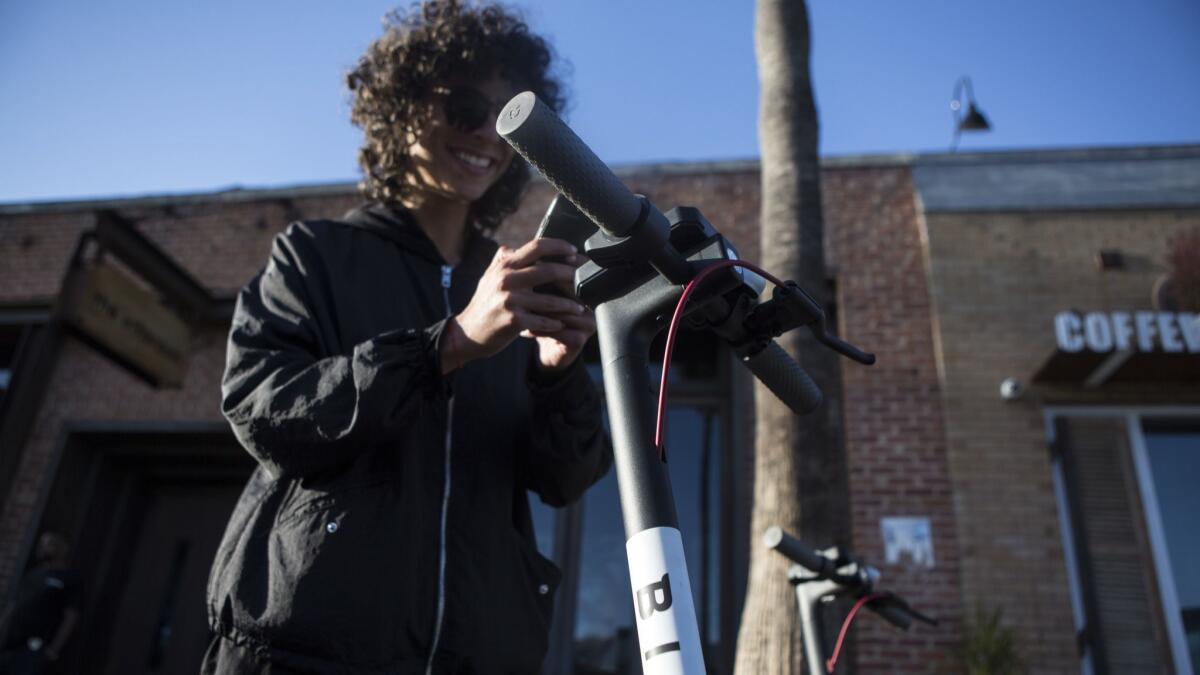Bird’s scooters have flooded the streets of major cities. But can the start-up control misbehaving riders?

- Share via
Reporting from San Francisco — Scooter rental start-up Bird wants customers to know its electric gadgets are not toys. It has produced educational videos and in-app notices to remind people to ride safely. It has given away helmets to anyone who wants one. And before a customer can even unlock a scooter, he or she has to agree to follow the rules of the road.
Still, many riders aren’t getting the message.
In cities where the scooters have launched, riders continue to flout local helmet rules, ride on sidewalks and disobey traffic laws.
Last week in Santa Monica, a man on a Bird scooter collided with a Honda sedan after zipping through a stop sign, resulting in what the Santa Monica Police Department described as a moderate head injury. The man was not wearing a helmet.
The struggle to get riders to keep themselves and others safe highlights one of the biggest challenges faced by the nascent scooter rental industry: How do you get people to behave responsibly when you give them something that looks — and rides — like a toy?
In every city with electric scooters, helmet use is low, and even those who know they should wear a helmet while riding often don’t.
“I don’t feel like carrying a helmet around with me just for the chance I might want to ride one that day,” said Gabriel Marshall, 28, who uses scooter rentals to commute in San Francisco because he thinks it’s more affordable — and fun — than taking the bus or UberPool.
He’s not alone.
“What bothers me is I walk around Santa Monica every day and I’ve never seen any of the scooter riders with a helmet,” said Dr. Wally Ghurabi, medical director of the Nethercutt Emergency Center at UCLA Medical Center in Santa Monica. “They seem to think they’re invincible.”
The city’s Fire Department has recorded at least 12 incidents involving Bird scooters since they appeared in Santa Monica last year. At nearby UCLA Medical Center, the ER has seen a few scooter incidents, mostly involving multiple abrasions and scrapes. Providence Health Service’s emergency departments have seen none.

Backed with more than $100 million in venture capital, Bird launched in its hometown of Santa Monica last September and has since flooded the streets of cities such as San Francisco, San Diego and Nashville with rechargeable scooters capable of traveling up to 15 miles an hour. Competitors LimeBike and Spin have followed similarly, charging customers a dollar to unlock the scooters and about 15 cents a minute. There are no formal parking spots — riders find the nearest scooter via a mobile app, and are encouraged to leave them on the sidewalk when they’re done.
Customers must have a valid credit card and driver’s license, a measure intended to ensure accountability and familiarity with road rules. Those who request a helmet from Bird receive a free one by mail; 22,000 have already been sent out, said company spokesman Kenneth Baer.
“Bird clearly urges riders not to ride on the sidewalk, but to ride on the road and in bike lanes where available,” Baer said.
Bird says it will shut down accounts of misbehaving users, but the company wouldn’t specify how many customers it has deactivated or why it has cracked down on specific accounts. “While we’ve had very few problems, we thoroughly investigate any reports of abuse and deactivate users when necessary,” Baer said.
But the specter of deactivation, the promise of free helmets and the frequency of in-app reminders have not been enough to convince all customers that they must follow the rules.
“I’m sure the safety messaging in the app was very comprehensive, but they didn’t actually make me read any of it,” said Rivers Langley, 31, of East Hollywood, who recently rode a Bird scooter without wearing a helmet. “I just pushed ‘I accept’ over and over until the scooter turned on.”
Fed up with chaotic riding and haphazard parking in their communities, some cities have taken it upon themselves to regulate scooter companies and their riders.
In Santa Monica, an emergency ordinance that passed this year gave the city the ability to impound mis-parked scooters. Bird also agreed to pay $300,000 in city fines. The city of Los Angeles this week began discussing regulation for the scooters, with the Transportation Department proposing a one-year test program that would limit each company — including the start-ups Bird, LimeBike and Jump Bikes — to no more than 2,500 vehicles within city limits, and would impose strict rules for parking and data sharing.
In San Francisco, city officials voted Tuesday to offer five companies, including Bird, a permit to each operate up to 500 scooters, allowing for a total of 2,500 scooters on the city’s streets. The city attorney and the Municipal Transportation Agency went an extra step on Thursday, ordering the start-ups to apply for proper permits or cease operations.
Aside from permitting, the city’s supervisors have also discussed designating parking areas for scooters to minimize tripping hazards for pedestrians and are currently formulating rules to regulate the use of motorized scooters.
In California, riding a motorized scooter without a helmet can result in a $190 fine, although it is unclear how widely the rule is enforced. The Santa Monica Police Department did not have an exact figure for the number of citations that have been issued this year. The Police Department in neighboring Venice said it does not track scooter citations.

It’s in the interest of scooter start-ups to keep regulation loose so that the barriers to entry remain low — the easier it is to hop onto a scooter and ride without fear of fines and citations, the more likely people are to sign up and pay for rides.
But too little oversight could also become a problem for the start-ups, which have already drawn the ire of local residents and regulators for flooding city streets with scooters.
Already, city officials and community members frustrated by poor rider behavior have blamed the companies for providing the scooters and not doing enough to promote safety.
After a launch that took a page from the tech world’s “ask forgiveness not permission” playbook, Bird Chief Executive Travis VanderZanden has expressed willingness to play nice with regulators. He signed a “Save Our Sidewalks” pledge that promised to grow the company responsibly, commit to daily pickup of scooters so they’re not haphazardly strewn on sidewalks, and remit $1 per vehicle per day to cities to help build infrastructure to make scooter riding safer.
Representatives from other scooter start-ups have also said that they are open to cooperating with regulators. LimeBike, for instance, says it is working with private businesses to allow people to park scooters on private property rather than on sidewalks, and is having discussions with helmet vendors to make it easier for riders to get headgear. The company said it has given away more than 1,000 helmets.
Getting people to actually wear the helmets remains a hurdle.
Part of the problem, according to those who have studied bike share programs, is that people tend to use bike shares (and, by extension, scooter shares) spontaneously, and few carry a helmet with them at all times.
“The data shows that in systems that don’t provide helmets, which is the vast majority, people don’t wear helmets at a very high rate,” said Luke Peters, a researcher at the University of Washington’s Sustainable Transportation Lab, which recently conducted a survey to study Seattle’s city-run station-based bike share system.
Seattle’s Pronto Cycle Share offered helmet rentals at each station because of the city’s stringent helmet law, which requires riders of all ages to don protective gear. Paying customers received a code to open a bin near the bikes containing a plastic-wrapped helmet to be returned at the end of the ride. Workers collected, cleaned, re-sealed and redistributed the helmets each day.
Pronto Cycle Share shuttered last year because of low ridership and high costs. Preliminary results from the Sustainable Transportation Lab’s survey found that 42% of respondents said they always wore a helmet, 31% said they sometimes wore a helmet, and 27% said they never wore a helmet.
The city has since allowed dockless bicycle sharing companies including LimeBike to launch — none of which provide helmets on-site. In a survey of dockless bike share riders, only 16% said they always wear a helmet, 32% said sometimes, while 52% said never.
Research is unclear on whether people don’t wear helmets because of access or convenience.
Anuj Gupta, deputy city manager of Santa Monica, says the vast majority of electric scooter riders still don’t use helmets. But since Bird started distributing free helmets, “we’ve seen more folks wearing them, and far fewer people are riding on sidewalks.”
Most of the scooter injuries Ghurabi has seen in his emergency room occurred on sidewalks where a pedestrian exiting a building is struck.
“If you’re a 70-kilogram person and you’re going at 10 miles an hour, the force from that is incredible,” Ghurabi said. “Wear a helmet, ride with caution, ride defensively, and within reason.”

Twitter: @traceylien
UPDATES:
May 24, 5:00 p.m.: This article was updated to include news of regulatory measures undertaken in Los Angeles and San Francisco.
This article was published May 23 at 4 a.m.







